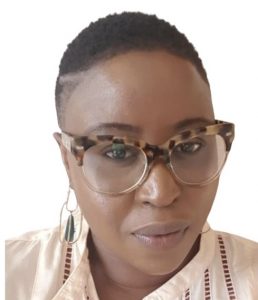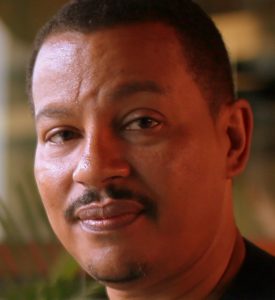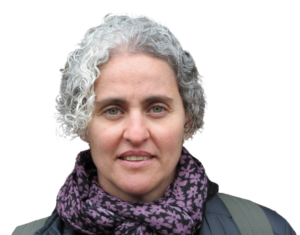What is the #ShiftThePower movement and how much has it achieved? This webinar aimed to answer these questions with insights from a panel of activists and professionals working with small, grassroots organisations within local communities. Bringing insights from across the philanthropy ecosystem, the panel reflected on power relations within the sector and how supporting the growing field of community philanthropy can activate change. This webinar was kindly sponsored by Giving for Change.
Moderated by Andrew Milner, associate editor for Alliance magazine, the speakers were Ese Emerhi, global network weaver Nigeria for Global Fund Community Foundations (GFCF); Irungu Houghton, executive director for Amnesty International Kenya; Rasha Sansur, the #ShiftThePower platform coordinator Palestine for GFCF and Graciela Hopstein, the executive coordinator for the Brazilian Philanthropy Network for Social Justice.
Ese Emerhi

Ese Emerhi, Global Fund Community Foundations, Nigeria
After Milner made the introductions, Ese Emerhi started off the panel by taking the audience through a brief history of the #ShiftThePower movement. She cited the report in 2010 by Jenny Hodgson and Barry knight that explored the emergence of community foundations as a new development paradigm.
In previous decades, community philanthropy was regarded as something that was supportive of, but not essential to, effective development. The report made the case for ‘shifting power closer to the ground, shifting agency to local people and valuing local assets’. Emerhi discussed her own experiences of leading a local community fund in Nigeria and how important it was to ‘hold space as a donor and bring people together in a community where there was mistrust and conflict.’
Here are a few key events that Emerhi cited as being important milestones in the #ShiftThePower movement:
- 2016 global summit on community philanthropy in Johannesburg, South Africa. This is where the #ShiftthePower hashtag was first used to link the growing community philanthropy field with the wider philanthropy landscape and where community philanthropy began to assume a new significance as a ‘central pillar in a framework for effective development.’
- 2016 special feature of Alliance magazine on #ShiftThePower
- March 2018 #ShiftThePower event in Zambia
- April 2018 Grantcraft report on how community philanthropy shifts power
- June 2019 #ShiftThePower event in Brazil
- November 2019 Pathways to Power symposium in London
Today the #ShiftThePower movement has gained ‘40 million twitter impressions and 50,000 tweets.’ Emerhi gave three examples of community philanthropy in action.
- The Tewa Womens fund in Nepal, which has 8000 local donors and no longer needs to go to the international community for funding
- The Kenya Community Development Foundation, which has mobilized over 1 million USD in local money.
- The Keeping it Real Foundation in Nigeria, which is inspiring change through education and working across 26 states in Nigeria.
These groups represent a new and more democratic movement in philanthropy, Emerhi concluded. #ShiftThePower ‘seeks to reform the practice of institutional aid and demands better for local people by engaging them as co-investors in their development.’
Irungu Houghton

Irungu Houghton, Amnesty International Kenya
The next speaker was Irungu Houghton, who reminisced on the 2016 Johannesburg event and how even then it was clear that the ‘top-down, brand-driven appetite for restricted funding by international NGOs…was a model that was beginning to collapse.’
He discussed the need for less bureaucracy and red tape within the international community, and how funding was becoming more restricted and short-term, with less space to maneuver. Houghton proposed that the sector should instead focus on ‘how to create bottom-up democratic models that allow for democratic governments.’
When people have ownership of what they are giving it motivates them to give, as they believe that they are giving for change.
Houghton went on to discuss the #BlackLivesMatter movement and police brutality in Kenya, Nigeria, and the U.S, where Amnesty International is active yet ‘institutionalised violence, corruption and a struggle for public oversight still remains.’ He posed the question: ‘can the model of an international NGO working globally ever change the systemic and structural basis for either racism or state violence?’
He stressed the importance of ‘building movements and community structures that bring power and dignity to their neighbourhoods.’ To exemplify this, he discussed how the Covid-19 pandemic affected the Kilimani neighbourhood in Nigeria, and how it rallied together to create a ‘community of care and protection’ that extended to the poorest and most vulnerable domestic workers.
Through that he began to get a sense of how to build a ‘power that was inclusive and challenging of the structures that produced either the racism or the discriminatory cultures that we see in international NGOs.’
Rasha Sansur

Rasha Sansur, GFCF, Palestine
Rasha Sansur opened by explaining what #ShiftThePower means to her, as someone ‘living under an Israeli apartheid settler colonial regime in Palestine.’ She described the daily threat of violence, oppression and racism she lives with and how ‘international conditional aid…has been feeding into this oppression and keeping the status quo of the occupation.’
Though Palestine has ‘one of the highest aid per capita in the world…Palestinians continue to become more dependent on the state with a weakened civil society.’ She described how the influx of foreign aid saw the ‘NGO sector taking the role of local committees and unions that were once active,’ and how registering as an NGO meant ‘a lot of competition over funding, which most of the time was conditional and serving the global development agenda and not local needs.’
Sansur discussed how in addition to the ‘continued Israeli aggression, occupation and local corruption, Palestinians no longer have control over their resources.’ Sansur briefly talked about the role of the Dalia association, which is a Palestinian community foundation that advocates for the rights of Palestinians to gain back control over their resources. Its goal is to ‘create an environment where people have self-determination’ using an ‘indigenous community philanthropy model’ that is applied to local context.
This model encourages people to make decisions around their own development through participatory grant making schemes, which helps them to regain confidence in ‘their ability to make decisions that matter to them and not to their donors.’ To Sansur, ‘#ShiftThePower is an inclusive movement and aligns greatly with Palestinians who have always demanded the right to self-determination.’
She concluded by introducing a new platform launched by GFCF and other associations to inspire change through #ShiftThePower. Content on the platform will be curated by members of the movement, with the goal of building solidarity within the community philanthropy sector and promoting ‘practices and structures that support people, that are for the people and are led by the people.’
You can visit the new platform at https://shiftthepower.org/
Graciela Hopstein

Graciela Hopstein, Brazilian Philanthropy Network for Social Justice
Graciela Hopstein began by introducing the Brazilian Philanthropy Network for Social Justice, which gathers 13 grant-making organisations, community foundations and funds that support civil society in the fields of social justice, human rights and community development. The network’s members take an intersectional approach involving political minorities and ‘mobilize their resources to enable civil society initiatives…because [they] understand this is an effective way to strengthen Brazilian democracy.’ The network’s members represent a ‘significant source of local funding for grassroots organisations, groups, and movements in Brazil.’
On the topic of the #ShiftThePower movement, Hopstein stated that it represented a ‘complete change of vision…it asked us to think broadly and openly about the local community philanthropy field.’ She discussed recognising diverse actors, including black and indigenous minorities, that have been acting in the field, and bringing them into the debate. She also spoke on the importance of acknowledging ‘ancestral modalities of philanthropy’ and ‘historical projects and initiatives that already exist in the field’ as well as recognising ‘the potential of communities…to organise themselves based on their own resources, assets, and recognising their power and capacity to solve their problems.’
She summarised this with the powerful statement: ‘empowerment implies giving power, and in fact it’s about recognising the power communities already have.’ She called on the sector to ‘rethink the roles of donors, and the imposition of top-down agendas that lead to investments that are not aligned with the realities of communities’. Hopstein hoped to avoid ‘dynamics of interference by imposing agendas or models…[which] legitimise and reproduce ways of exercising colonial, white, male, heteronormative power.’
She finished by stating that ‘philanthropy has to work with communities, recognising their power of transformation….languages, traditions, ancestry and values.’
Q&A
The floor was then opened up to questions. Tosca Bruno-van Vijfeijken asked, ‘what is the role of INGOs if and once #shiftthepower has been put into effect?’
Irungu Houghton answered this question by discussing the need for organisations to have an exit strategy and to ask themselves ‘at what point is our work done here and when do we move on?’ He also touched on the problems with getting locked into power dynamics that are ‘upward-accountability relationships rather than downward-accountability relationships’. He stated that a new paradigm is needed to leave organisations more empowered to help others.
Nico Smith from the audience asked, ‘what will the world of international cooperation look like after the power has shifted?’
Ese Emerhi took this question, answering ‘unless we truly #ShiftThePower, the next generation is going to shift us out of power.’ She spoke about the Giving for Change programme, which is addressing the question of how the sector can change the system from the ground up, and how it can dignify and amplify the growth of #ShiftThePower.
The programme is working with national actors, institutions, and community foundations to collect data on how to activate change across eight countries (Kenya, Ghana, Uganda, Ethiopia, Mozambique, Burkina Faso, Brazil and Palestine). It’s grappling with issues of ‘shrinking civic space, donor dependency, asymmetrical power relations and… the reality of Covid-19.’ Giving for Change is about ‘taking community philanthropy to the next level, and fostering local giving as an expression of voice, agency, civic participation and solidarity.’
Can the model of an international NGO working globally ever change the systemic and structural basis for either racism or state violence?
Mervat Rishmawi asked, ‘how can groups and funds raise funding from communities that are themselves facing a dire economic situation? how do you overcome that?’
Rasha Sansur replied by reflecting on her experiences working at the Dalia association: ‘when you do community philanthropy, when you raise money from the community…people start to gain confidence in themselves and they start to believe in it, and this turns into a domino effect…it’s very effective, people start giving.’
She stated that when ‘people have ownership of what they are giving, it motivates them to give as they believe that they are giving for change.’
The next question was, ‘how can national NGOs work closer to the ground with community-based organisations to shift the power?’
Irungu Houghton replied by stressing the importance of ‘participatory planning’ and ‘the discipline that comes with spending time to understand and listen to what the community says they want.’ He also stated the importance of giving a voice to the ‘parts of the community that are silenced either by gender or by class’ and added that ‘most of the time bringing too much money into a community is dangerous because it allows for the patriarchy and elites to hijack the initiative,’ preventing real transformation.
He neatly summed up his answer by emphasizing the importance of ‘listening, learning and asking the right questions’ as the ‘people who are being affected most by the problem [should be] the ones articulating the solutions, and being amplified by national organisations.’
Rosien Herweijer asked, ‘what makes community foundations better when it come to being accountable to the entire community, including the powerless?’
Ese replied by stating that ‘community philanthropy is based on the idea that all communities have assets already – money, skills, knowledge, networks. When these are pooled together, they build community power and voice.’ She discussed how involving communities as co-investors with a stake in their own development meant they cared more about the outcomes. INGOs are still relevant, but they must give ‘agency to people to be able to articulate the solutions to their own problems.’
Emerhi called on donors and funders in the space to ‘move beyond project-cycle funding’ and focus more on ‘truly understanding the needs of people.’ She suggested ‘flexible multi-year funding to support the growth of research, knowledge and capacity of small organisations’ and stated that the way forward is to go ‘beyond self-imposed limitations’ and democratise philanthropy.
Anima Sharma asked, ‘do we really need a shift in power or just a balance?’
Houghton suggested that ‘balance’ does already suggest a shift in power, and that ‘transform power’ might be an even more appropriate term. He said that rather than getting distracted by criticising INGOs, there should be more focus on the ‘structures and systems of power that keep developing countries unable to develop their own industry.’ He called for more focus on tackling issues such as the digital divide and climate change that directly affects these nations. He concluded by saying that while ‘INGOs are not the problem, they are part of the ecosystem that is the problem.’
For the final question, Stu Wambulawae asked, ‘how can we go about addressing the issue of structural racism that exists in developmental aid, and ensure that people actually buy into #ShiftThePower and not think that is one other thing that the Global North expects from us?’
Ese answered by stating that issues of racism, feminism, women’s rights and general human rights will always be part of the #ShiftThePower conversion, as it means ‘unpacking the things that have led to barriers over time in international aid.’
She praised the idea of giving more ‘leadership roles to different types of people to lead that change themselves’ and added that ‘it’s about being flexible and open to allowing mistakes to be made, and learning from that collectively.’
Annmarie McQueen is the Marketing, Advertising & Events Manager at Alliance
Watch a recording of the discussion below:
To continue the discussion around #ShiftThePower, you can register for the online event on 17 June run by the Centre for Strategic Philanthropy at the University of Cambridge Judge Business School.
The next Alliance webinar takes place on Wednesday 16th June, 5pm BST, and is titled ‘climate philanthropy now: where should philanthropy put its funding?’ You can register to attend here.



Comments (0)